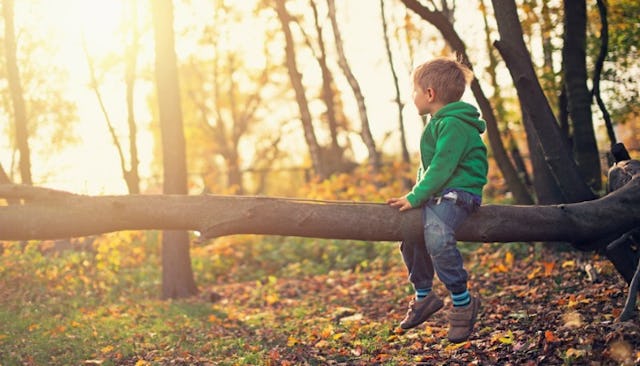Overprotective Helicopter Parenting: Breaking The Cycle

It’s no secret that we tend to be more like our parents over the years. First, we try to get as far from them as we can. Then, as we become parents ourselves, we think that maybe, just maybe, our mother and father weren’t so wrong after all. Then, one day, we hear our mothers speaking through our mouths to our children and realize that the cycle continues — whether we wanted it to or not.
We adopt our parenting styles in different ways and often it’s not by choice — more like a mother tongue we learn word by word as it is spoken in our family, in that particular manner: intonations, filler words, and favorite proverbs. As the way of thinking develops, so too does the outlook on the world. Is this the wisdom of generations or just an ambiguous feature that runs in the family?
My mother used to say a number of phrases that were her answers to everything: “I will be worrying.” “Do you want something bad to happen to you?’” “The world is dangerous!” and the like.
Me: Why can’t I go camping with my class? The teacher’s gonna be there!
My mother: I’d rather you didn’t. I’ll be worrying
Me: Please, let me go to the dance! Don’t you trust me?
My mother: I don’t trust others. The world is dangerous
Me: I would love to learn how to ride a bike!
My mother: Do you want to break your neck?
Nothing was safe enough, and I never was safe enough. When I grew a bit older, I started to protest and negotiate, and then came the master phrase: “When you’re a parent, you will know how I feel.”
And I did. Good gracious, how I did. When I saw my firstborn for the first time, I became overwhelmed with worry and responsibility. So fragile she seemed to me, so vulnerable. I was the one who must protect her, as she depended on me entirely.
I’m certain that every mother in the world is flooded with such feelings, swept off her feet, trying desperately to find something to hold on to, a patch of firm ground to stand on. For me it was vigilance—I watched her every minute. It was easy at first; all I had to do was organizing a safe space around her.
At first, it was her crib. The area spread foot by foot, as she was learning to stretch her arms between the bars and grab things, as she was making her first attempts to crawl. As she rose up and took her first step, my heart skipped a beat. Was it joy, pride, amazement? I’m afraid it wasn’t. It was utter fear. I was terrified that she might stumble and get hurt. “Careful there. You don’t want to tumble over, do you?” I said.
And that was it; I heard my mom speaking this.
I was fighting an absurd feeling — I did not want my baby to grow older, because the older she was, the less control I had and the more dangers crowded in upon her from all sides. I couldn’t ward them all off and that was too much. I knew that this was wrong, that if it were to continue I would be smothering my baby instead of mothering her. I had to let her go. Yet it is always easier said than done, isn’t it? Overprotection runs in families like a heart defect or a mental disease.
I know now that behind the words “I’ll be worrying,” the thought that followed was always “Should anything happen to you, I will never forgive myself.”
I know that every helicopter parent only wants their children to be alive and well. Yet are they well, when they are deprived of their basic rights? Children have been designed to be risk-takers; they are entitled to new experiences. Only through this risk-taking and coping do they grow to the best of their potential.
Would you forgive yourself for crippling them with your love? Would your rather forgive yourself for making them fearful, nervous, dependent and indecisive, for rendering them incapable of enjoying challenges — and life is full of challenges, no less than it is full of dangers — than for letting them climb that darn tree, even if they smash their tiny button of a nose eventually? Every kid has a right to run, fall, scrape a knee, shed a tear, and get over it.
I think we should give them enough credit to handle what used to be an inherent part of their ancestral past.
Yes, the world is a dangerous place, but it is far too hectic to be controlled. Since I stopped trying to control everything, I’ve felt nothing if not better. Overprotective parents aren’t happy parents because they take too much on their shoulders, and an unhappy parent can never be good for a child; one’s anxiety passes on to one’s kids.
Apart from feeling unsafe and insecure because of their parents being constantly worried, these kids also become the guardians of grown-ups’ well-being and peace of mind. They decide not to go places and not to do stuff to keep you sane and well. They are that empathic, intelligent and resolute. Don’t you think they are reasonable enough not to jump off the cliff, even if everyone else does? Don’t you trust them to handle their own life?
I do hope that I will keep it together when she is older. I still worry. I am worried sick each time I see her swinging head down from the chin-up bar. Yet I do my best not to hover over her, huffing and puffing. I am letting her go to learn her own hard way, no matter how painful it is (for me, mostly). I am breaking the vicious circle, and I am getting rid of the vexatious family trait.
This article was originally published on